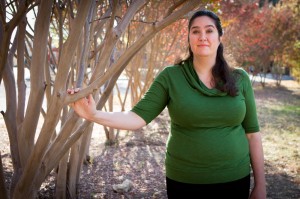As a counselor at Texas Christian University working with low- and middle-income clients, Genny Rowley found herself asking the same questions over and over again:
How can you care for individuals without caring for the world around them?
How do you help someone cope with family crises without discussing their breathing problems caused by polluted air?

Rowley, a doctoral student at TCU’s Brite Divinity School, discovered she could learn as much from those looking for answers as from the professors who provided them.
“I began to be uncomfortable with a theological tradition that didn’t pay attention to the connection between physical and mental health,” Rowley said. “I want to find people of faith who care about the environment and are doing something about it.”
Sitting at Magnolia Avenue’s Avoca coffee shop on a blustery afternoon, Rowley warmed to the subject of religious environmentalism as quickly as her hot mug of tea warmed her hands. She spoke with the passion of an academic who loves her subject and perhaps doesn’t get many opportunities for prolonged elocution.
“Particularly in Christian theology, the [human] body has been de-emphasized” and disconnected from spirituality, she said. “It’s still a pretty exciting thing to find religious people interested in the environment, people who have explicitly said that environmental activism is an expression of their faith.”
Rowley has been spending a lot of time with those people lately, as both a doctoral student and an activist in her own right. She’s a founding member of Dallas Interfaith Power and Light and is helping plan a two-day conference in May to educate grassroots environmental organizations on local activism aimed at addressing climate change.
For her dissertation, which will likely be published this spring, she studied three churches engaged in some form of environmental activism, representing different denominations in different parts of the country. At two of the churches, the pastors had never sermonized about climate change.
All the churches average 400 people in Sunday attendance, but in each case, the activists number only a dozen.
“It’s the passion of a few concerned laypeople making it happen,” Rowley said.
Restricted by rules of her dissertation board, Rowley declined to name the churches she studied, partially because statements made by the individual activists might conflict with the consensus of their congregation –– and perhaps with the official doctrine of their denomination.
“Some people made the claim that the Earth should be treated as a neighbor” [as in ‘love thy neighbor’], Rowley said. “Theologically, I can see how some Texans would have a problem with that.”
The three groups tackled environmentalism in their own ways.
A group from an Episcopal church in the Midwest built green spaces throughout their city to attract birds and small animals to increase the area’s urban biodiversity. They also pushed for sustainability by expanding the church’s recycling efforts to include electronics and pharmaceuticals.
On the Gulf Coast, a Lutheran church took residents on guided “toxic tours” of environmentally degraded neighborhoods, illustrating how often pollution disproportionately affects lower-income residents.
A Baptist church in the Southeast shelled out some serious bucks to cover its roof in solar panels, motivating a conversation among residents about using solar energy for their homes. Members of the congregation also lobbied the state for more stringent regulations of coal-fired power plants.
These groups are small, but Rowley believes they are gathering momentum in a way that hasn’t been seen before.
Just a year ago, there was no interfaith coalition in Fort Worth. Now it’s starting to happen here too.
“I see this as an engagement of relevant cultural issues. As persons of faith, we’re called to engage with the issues of the times,” she said. “Something is happening. I’m not sure what to call it, but it’s exciting.”
Not everyone is convinced, however, that the tide is turning all that quickly — or that it has even reached the shore.
*********
If someone handed out an award for the most science-hating rant, U.S. Rep. Paul Broun of Georgia would surely take home this year’s prize.
Broun, who sits on the House Science Committee, believes the Earth was created in six days about 9,000 years ago.
That’s the reasonable part.
“God’s word is true,” Broun said in October during videotaped comments at a Baptist church in Hartwell, Ga. “I’ve come to understand that. All that stuff I was taught about evolution and embryology and Big Bang theory, all that is lies straight from the pit of hell. And it’s lies to try to keep me and all the folks who are taught that from understanding that they need a savior.”
No, he didn’t say anything about climate change specifically, but he didn’t have to. Statements like these are a major reason that many environmentalists remain skeptical about devout Christians leading the charge on climate change.
The committee’s chair, for example, is Texan Ralph Hall, who said in December 2011 that humans couldn’t cause global warming because “I don’t think we can control what God controls.”
This kind of thinking isn’t limited to politicians: While less than half of registered Republican voters believe in climate change, an October survey by Public Policy Polling found that 68 percent of them believe in demonic possession.











